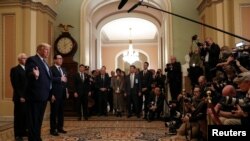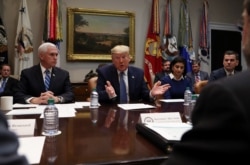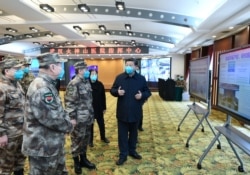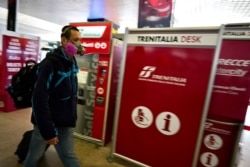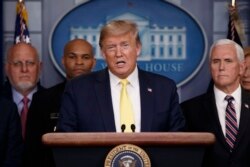U.S. health insurance companies will cover costs for coronavirus testing, Vice President Mike Pence said at a White House meeting Tuesday with company executives.
"All of the insurance companies here today or before today have agreed to waive all co-pays on coronavirus testing and extend coverage for coronavirus treatment in all of their benefit plans," Pence said.
Pence said the companies will also pay for costs to provide telemedicine care to patients so that they do not have to leave home.
U.S. President Donald Trump is expected to announce a proposed economic stimulus package Tuesday in response to the outbreak after discussing it earlier in the day with Senate Republicans. Included in the proposal is a payroll tax cut, an idea that has drawn opposition from some Republicans and Democrats.
Senate Democratic Leader Charles Schumer said Tuesday the top priority for the U.S. should instead be accelerating testing capabilities.
"I think the U.S. has done a very good job in testing," Trump told reporters after meeting with the senators. "It will go away, just stay calm."
Xi visits Wuhan
Chinese President Xi Jinping traveled Tuesday to the city of Wuhan for his first visit since the area became the center of a coronavirus outbreak that has infected more than 80,000 people and killed 3,100 in China.
Xi, wearing a mask, met with medical workers and patients at several sites in Wuhan, capital of the Hubei province, including a hospital that was built in days specifically for COVID-19 patients.
"Through arduous efforts, there has been a promising turn in epidemic containment in Hubai and Wuhan, and we have achieved important interim results," state media reported Xi as saying.
Xi, who also inspected efforts to control the outbreak, visited Wuhan as health officials reported 19 new cases Tuesday, part of a continuing trend of fewer and fewer infections in China as the virus spreads more rapidly in other countries. About 70% of China's cases have already recovered.
'Very real' threat
Part of China's response was to lock down large areas to try to prevent the virus from spreading at large gatherings or among travelers going to other areas in the country.
Italy is now taking the same strategy after becoming one of the largest outbreak sites outside of China, with more than 9,000 cases and 460 deaths.
The Italian government initially put restrictions on the northern part of the country, but Tuesday brought the start of travel restrictions to the entire country of 60 million people.
In Iran, officials said Tuesday the coronavirus has killed 54 more people, bringing the death toll in the Islamic Republic to 291.
The head of the World Health Organization said Monday that the coronavirus has gained a foothold in so many countries that "the threat of a pandemic has become very real." But WHO Director-General Tedros Adhanom Ghebreyesus voiced optimism, as well, saying, it "would be the first pandemic in history that could be controlled."
Outbreaks in U.S.
In the United States, which has about 700 cases and 28 deaths from the virus, several areas with outbreaks are banning large gatherings, while major universities, including Harvard, Stanford, the University of Washington and Ohio State University are holding classes only online.
In New York state, Governor Andrew Cuomo announced the establishment of containment areas to combat the virus in the city of New Rochelle. Large gathering locations such as schools and places of worship within a one-mile zone of the city have been ordered to close for 14 days. New Rochelle is located in Westchester County, which is developing as the epicenter of the outbreak in the state.
The outbreak has prompted Defense Secretary Mark Esper to cancel an upcoming overseas trip.
"Out of an abundance of caution, the secretary of defense has decided to postpone his travel to India, Uzbekistan and Pakistan until a later date to remain in the U.S. to help manage the DoD response" to COVID-19, his press secretary said.
Four members of the U.S. Congress are self-quarantining after having contact at a recent political conference with someone who tested positive. Incoming White House chief of staff Mark Meadows may have had contact and is also isolating himself until Wednesday.
Trump, who spoke at the conference and had contact with several people who had direct contact with the infected person, has not been tested for the coronavirus.
White House press secretary Stephanie Grisham said in a statement late Monday the president "has neither had prolonged close contact with any known confirmed COVID-19 patients, nor does he have any symptoms," and that White House doctors will monitor him.
Elsewhere, Germany reported its first two deaths from the coronavirus, but Chancellor Angela Merkel warned against thinking that it is in vain to try to halt the spread of the virus.




